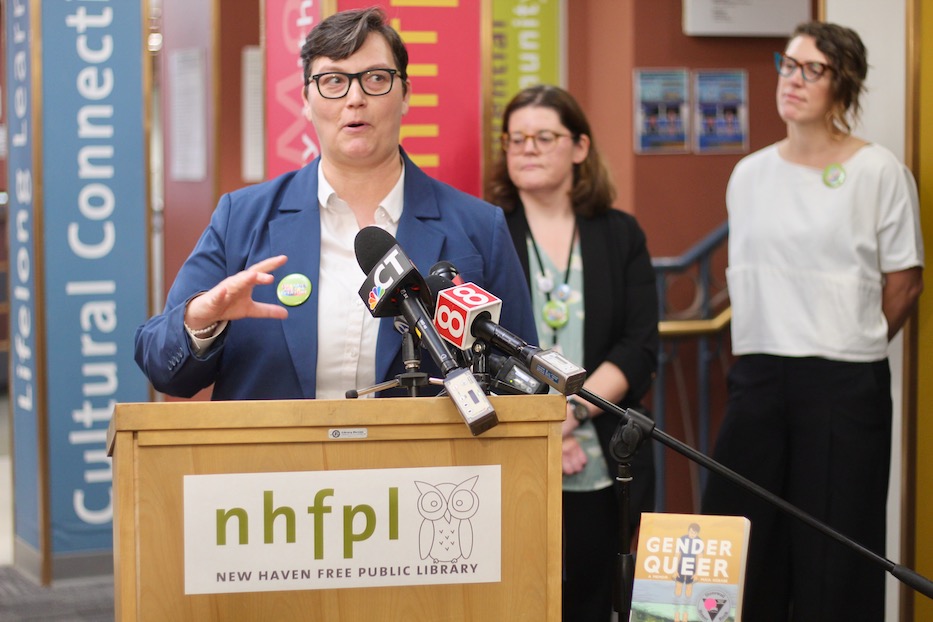
Books | Culture & Community | Arts & Culture | New Haven Free Public Library | Literacy | Education
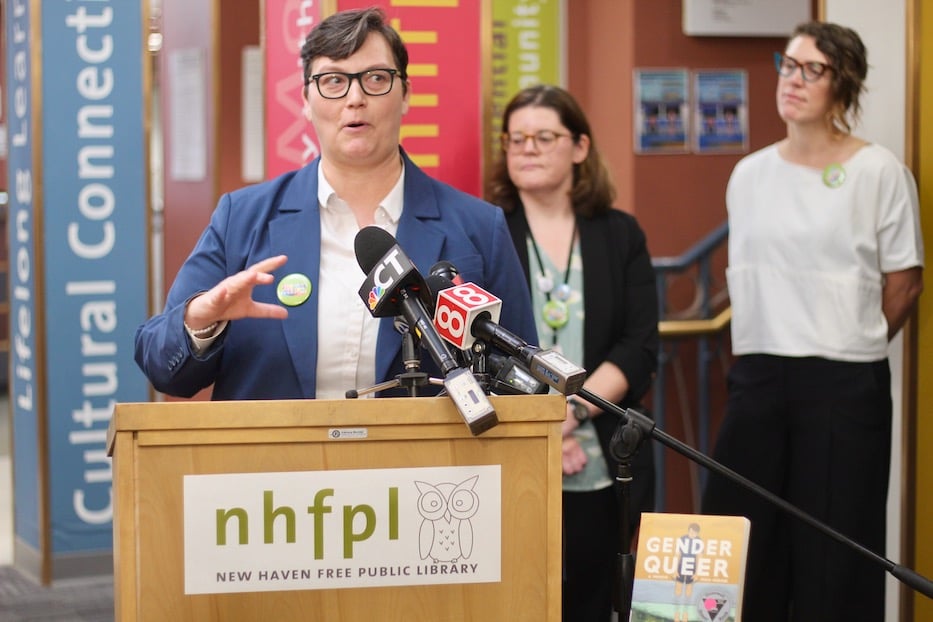
State Rep. Dominique Johnson. Maia Kobabe's Gender Queer: A Memoir, which is next to her, is the most banned and challenged book of 2022. Lucy Gellman Photos.
State Rep. Dominique Johnson stood at the checkout desk, peering at librarian Scott Miller through a panel of plexiglass. Between both hands, she gripped copies of Alison Bechdel's Fun Home and F. Arturo Rosales' Chicano! The History of the Mexican American Civil Rights Movement. Behind her, a display with titles including Maus, Their Eyes Were Watching God, How The Word Is Passed and The Absolutely True Diary of a Part-Time Indian sat at the ready, just waiting for new eyes.
Johnson has read Bechdel's Fun Home many times—it’s the kind of book in which she sees herself reflected. But after learning that it had been banned from multiple school districts in Missouri and South Dakota last year alone, it seemed like enough of a reason to pick it back up and champion the LGBTQ-affirming story inside.
Tuesday morning, Johnson joined Lt. Gov. Susan Bysiewicz, New Haven City Librarian Maria Bernhey, and State Library Director of the Division of Library Development Dawn LaValle at the New Haven Free Public Library (NHFPL) to kick off Banned Books Week, a celebration of literary freedom and fierce defense of access to information. This year, the week's theme is the "Freedom To Read," a timely rebuke of censorship that recognizes the power of libraries and librarians.
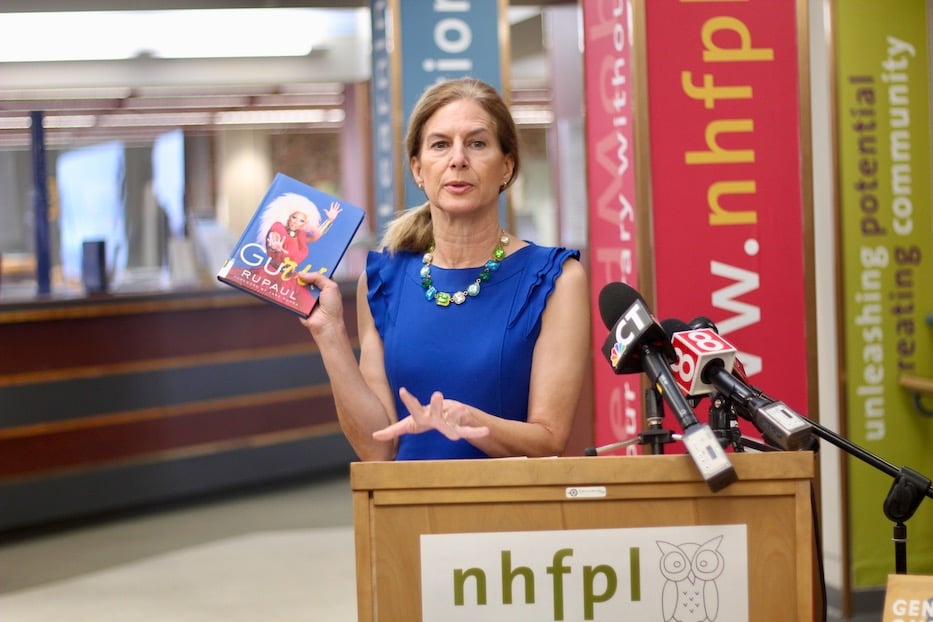
Lt. Gov. Susan Bysiewicz: “Freedom to access information and to read different stories fosters empathy, critical thinking and intellectual freedom."
"Books have the power to transport us to new worlds, introduce us to people, perspectives and ideas, and they may let us encounter things by reading that we might not encounter in real life and spark our imaginations,” Bysiewicz said. “Freedom to access information and to read different stories fosters empathy, critical thinking and intellectual freedom—values that are fundamental to a free, diverse and democratic society.”
“When libraries are asked to censor books, the message that we're sending is that your viewpoint doesn't matter, or that you should be ashamed, or that we're excluding certain ideas or individuals from the library,” Bernhey added. “And that is entirely the opposite of the goal of a public library.”
First launched in 1982 and commemorated annually by the American Library Association (ALA) and libraries across the U.S., Banned Books Week seeks to bring attention to proposed and successful attempts to ban books around the country, from public libraries to board of education meetings that devolve into shouting matches. This fall, it comes at a time when challenges to books, often mounted at school board and PTA meetings and increasingly in public libraries, are precipitously on the rise.
Last year alone, the ALA reported challenges to 2,571 unique titles, from Maia Kobabe's Gender Queer: A Memoir to Toni Morrison's The Bluest Eye to Jesse Andrews’ Me and Earl and the Dying Girl. It's a number that's growing: the ALA logged roughly 1,800 such attempts in 2021, compared to 223 in 2020.
Across the country, the challenges often target books with LGBTQ+ authors and characters, as well as books by authors of color, and books in which writers and characters live at one or more of those intersections (for instance, George M. Johnson's All Boys Aren't Blue). Writers Zora Neale Hurston, Toni Morrison, and Sherman Alexie, as well as Marjane Satrapi and Khaled Hosseini, all remain high on the list.
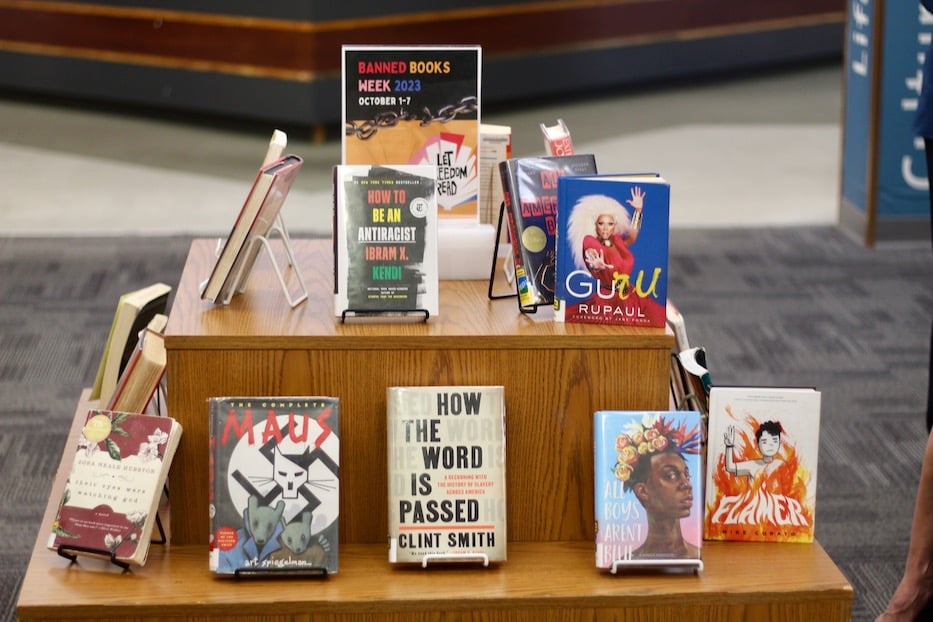
Some of 2022's most banned books.
Connecticut is not exempt, Bysiewicz noted: the state has already seen challenges to 109 titles this year (those represent only 14 people making those challenges), a trend she sees as intimately tied to a concurrent rise in hate crimes across the state. In June, for instance, the Newtown Board of Education weighed banning Mike Curato's Flamer and Craig Thompson's Blankets, the latter of which had never even been checked out from the school library. That same month in Wallingford, a handful of community members requested that a Pride Week display at the public library be taken down.
In Colchester last year, copies of Nico Medina's Who Is RuPaul? were removed from the children's section of the public library last year after Republican First Selectman Andreas Bisbikos claimed that it included explicit and graphic content (it includes neither) and asked for a full inventory of children’s books in the building. Then this summer, residents of Brookfield mounted a campaign against Juno Dawson's This Book Is Gay at the town's high school.
In towns that range from Guilford to Greenwich to Darien, challenged titles include everything from Jessica Love’s Julian Is A Mermaid to Erika Moen and Matthew Nolan's Let's Talk About It: The Teen's Guide to Sex, Relationships, and Being a Human. As of this year, Dawson's title has also been unsuccessfully challenged in Westport, where a single parent also sought to ban Flamer and Gender Queer at Staples High School.
"This is very disturbing from an equity point of view," Bysiewicz said, noting that the Anti-Defamation League has reported an unprecedented rise in hate crimes across the state in the last four years. "For members of marginalized communities, either communities of color or LGBTQ+ communities, to have challenges to books that showcase them is incredibly disturbing. Today, we want to talk about tolerance."
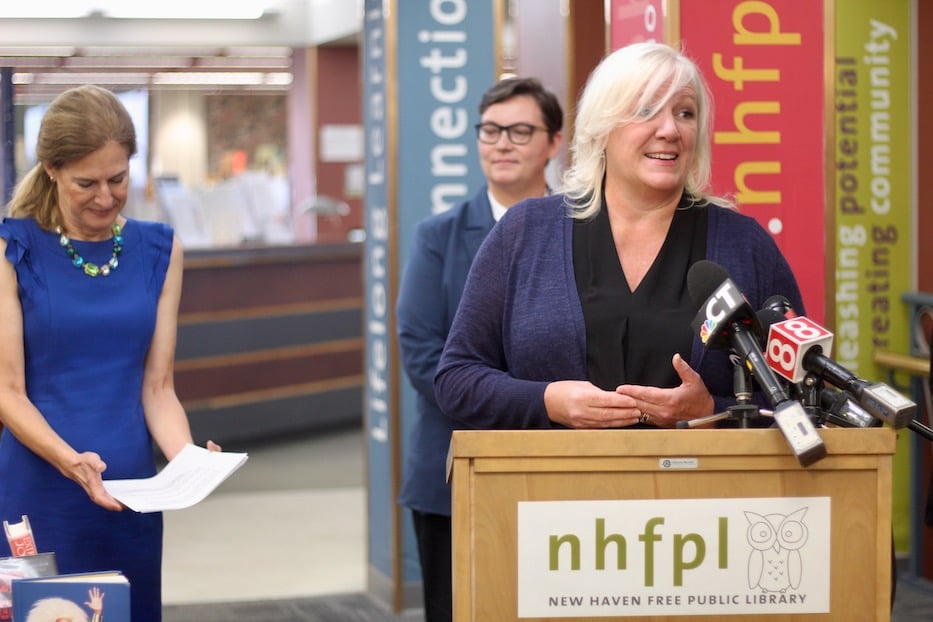
Dawn LaValle, State Library Director of the Division of Library Development.
And for the remainder of Tuesday morning’s visit, they did. Johnson, who serves Norwalk and Westport in the Connecticut General Assembly, remembered the role that public libraries played in her own childhood, well before books with LGBTQ+ protagonists were easy to find. While "I didn't have a lot of books, many books at all, that were published that allowed me as a young LGBTQ person to see myself reflected," she still gravitated toward the library as a safe haven, where she was welcome to come just as she was.
As queer people have become more visible, Johnson said, she's learned to expect more violent and reactionary pushback—and to use her voice to defend the rights of fellow LGBTQ+ people, and marginalized people from multiple backgrounds. As a state representative, she is currently part of Connecticut’s LGBTQ+ Caucus, as well as the CGA’s Education Committee, Higher Education and Employment Advancement Committee, and Joint Committee on Judiciary. It makes her fight for the rights of young people—and readers of all ages—to exercise choice and agency over the books they’re able to pick up.
"If our kids can see it, they can be it," she said. She pointed to Illinois HB2789, a bill outlawing book bans in the state. In June, Illinois Governor JB Pritzker signed it officially into law—making Illinois the first state to do so. In Connecticut, Johnson said, legislators could be using it as a template.
“These are our lives,” she said. “There's a visibility to LGBTQ people now, [and] I think that is at the root of this. It makes some folks very uncomfortable. But we are just as American as the next person. When our children in our community can write their own futures in these libraries, they need to have access to the stories of the past and present. If you deny that, how can they be part of this democracy?”
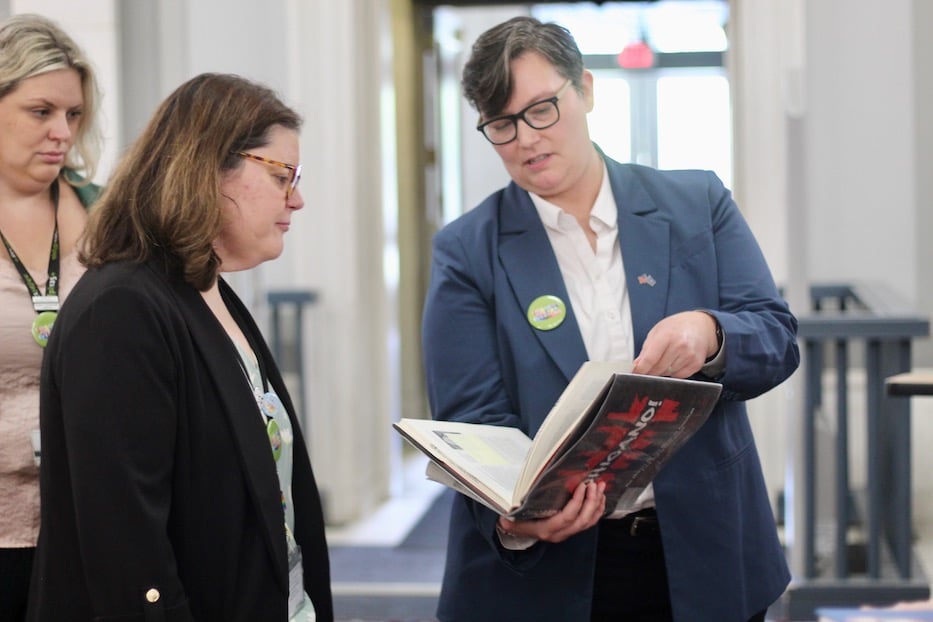
New Haven City Librarian Maria Bernhey and State Rep. Dominique Johnson look over a copy of Chicano!
Noting her early love for J.D. Salinger's Catcher In The Rye—a title that has been banned many times since its publication in 1951—LaValle likewise pointed to the freedom to read as a fundamental equity issue. In Connecticut, one of the ways librarians promote access is through borrowIT CT, a program that lets patrons check out books across municipalities. Currently, 191 libraries participate in the program—including all five branches of the NHFPL.
LaValle also praised the Connecticut Library Association's Intellectual Freedom Committee, which records and tracks challenges to books as they arise. From that data, she said, librarians can see that "our challenges are coming from within the state," which is not uniformly the case across the country. Nationwide, the majority of proposed book bans come from a small handful of individuals and right-leaning organizations that are organizing against specific titles.
In Westport, that was the case—it was one mom who proposed banning three books, none of which she appeared to have read. Ultimately, Johnson said, the issue was resolved and her complaint was withdrawn.
Connecticut is in the house! 🗣️ @LGSusanB & the LGBTQ+ Caucus show some love to @thatssoamethyst, @TheRobinFierce, @LooseyLaDuca & @thatbitchjax! 🫶 #DragRace pic.twitter.com/seo8jtMV30
— RuPaul's Drag Race (@RuPaulsDragRace) April 8, 2023
Before leaving, both she and Bysiewicz picked up copies of banned books to take home with them. Bysiewicz, who earlier this year had a video spot on RuPaul’s Drag Race, picked up Flamer (“I want to see what all the fuss is about,” she said) and a biography of RuPaul that she knows not to take for granted after last years uproar in Colchester.
As she made her way to the checkout desk, she chatted about the show, which she started paying attention to when three Connecticut queens joined the cast to compete this year. She smiled as she slid the books across the counter, and librarian Scott Miller scanned her card. As he processed the book, he explained that she could return it to her home library in Middletown—borrowIT CT would take care of the rest.
“If I could only do my eye makeup like RuPaul, I would be in business,” she said with a laugh.

